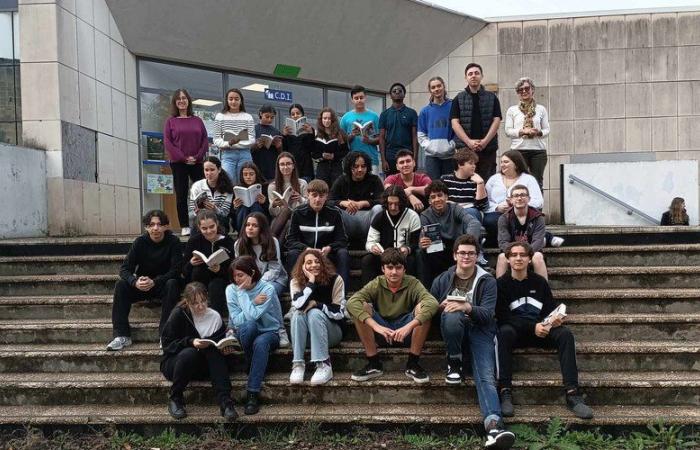
Since September, a veritable reading marathon has begun for the students of Jean-Moulin high school. Before November 20, they must elect their trio of works and a delegate to defend it, in Nîmes.
“I don’t really understand your argument.”says a student after his friend speaks. This Wednesday, December 6, the debates are going well, at the Jean-Moulin high school, in Béziers. This year, the second class is participating in the Goncourt des lycéens, a national event (read below).
“We applied for the Goncourt for high school students at the end of the school year, explains Patricia Castanier, French teacher at Jean-Moulin high school. We decided to carry out this work as a team, to experience this great adventure, which we had already experienced six years ago, with a first class class.”
“A sort of reading marathon”
Since receiving the fourteen books, identical to those presented during the Goncourt Prize, at the beginning of September, a real race against time has been launched for this class. “We must have students read these fourteen books, indicates Patricia Castanier. Then, we must establish our trifecta and elect a delegate before November 20. When he is elected, he will go to Nîmes on November 25 to debate with those from the academies in the south of France.”
A whole organization was put in place in the French course. “We support reading until November 20, while organizing debates and activities, oral or writing, around books, the professor advances. A sort of reading marathon is taking place. We have students who read little, or not at all, and even those who do have not yet switched to adult literature. They are very young readers, it’s a real challenge.”
“I would like to be elected delegate”
This is not to displease students, especially those who love literature. “I already knew Goncourt, I like reading, smiles Agathe. From the selection, several books appealed to me, my favorite is “The Bastion of Tears”. So far, I’ve read seven, I’m reading the eighth. I would really like to be elected as a delegate to go and debate in Nîmes.”
Milo also started the marathon: “I read from time to time, but now I would like to read the fourteen books in the selection. For the moment, I really liked “Houris” and “Madelaine avant l’aube”. At first, I would have liked loved being a delegate, today, I don’t really know anymore.”
An enriching experience for all
The experience is very enriching for the entire class. On October 17, the high school students went to Aix-en-Provence to meet nine of the authors participating in Goncourt. They had prepared questions and had their books signed.
Patricia Castanier discovers a new side of her students. “What’s great is that we discuss books with them all the time, she rejoices. Often, when I meet them in the corridors, they come to give me their impressions of what they are reading. Conversely, we try to motivate them when they have difficulty reading.”
How does it work?
The Goncourt prize for high school students is awarded by the high school students themselves. It allows students from around fifty classes to discover and read all of the new literary novels included in the Goncourt academy selection. “The specifications require that the class has read all of the books selected, explains Patricia Castanier. We must organize debates regularly, without influencing the students.”
After the two months of deliberations, each class elects a delegate to present the trifecta. He will defend the choices during regional deliberations. Each region chooses its two representatives and its trifecta of winning books. A final will then be held in Rennes, birthplace of the Prize. At the end of the deliberations, the Goncourt prize for high school students will be proclaimed and made public.





